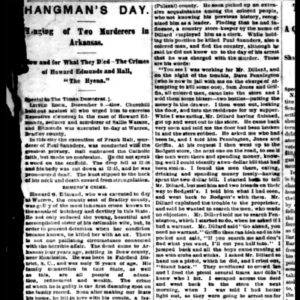calsfoundation@cals.org
Frank Hall (Execution of)
Frank Hall was an African American man hanged in Little Rock (Pulaski County) on December 9, 1881, for murder, although he proclaimed his innocence up to his death.
Frank Hall, also known as Lewis Hall, was born enslaved in Rowan County, North Carolina. Described as five feet ten inches tall and “when walking swaggers and is loose-jointed,” Hall was recruited to come to Arkansas as a laborer, finding work in Monroe County. The Arkansas Democrat reported that he soon became known as a “desperado,” suspected of murdering a man after moving to Lonoke County. He spent three years in prison for stealing money from a child and left Lonoke County after his release.
He moved to a community about eight miles from Little Rock in Pulaski County and was hired as a clerk in a country store. It was reported that he “had been a source of disturbance ever since he went into the neighborhood,” about nine months before the incident.
On the evening of June 14, 1879, he went to a party at the home of Abe Washington on the Badgett place, where he got into an argument with a Black man named Russell Pennington, who Hall later claimed had stolen money from the store where he worked. As the quarrel grew more heated, “several parties present saw that it would be necessary to effect a separation. This was done.”
Hall left but, when about fifty yards away, fired a pistol at Pennington several times. He soon returned bearing a double-barreled shotgun, which he fired toward Pennington but instead hit a Black man named Paul Saunders, “a quiet, peaceable citizen,” who fell to the ground. Firing again, he wounded a white man named Jack Mitchel, and the Arkansas Gazette reported that “two men had been shot, one whose brains lay beside him on the ground, and another whose blood profusely flowed.” Mitchel survived his wounds.
Hall fled, and in September 1879 Governor William Read Miller offered a $200 reward for his capture. A Desha County deputy sheriff apprehended him on September 5, 1881, “near the scene of his crime”—he later claimed that it was not until the time of his arrest that he learned Saunders was dead.
Though Hall claimed to be innocent, a Pulaski County jury convicted him of first-degree murder on October 4, 1881. He was sentenced to hang.
On the day of his execution, an Arkansas Democrat reporter interviewed him, and Hall again proclaimed his innocence. It took his jailers half an hour to break off the shackles binding his ankles, but around noon on December 9, 1881, Hall left the jail accompanied by two priests, having embraced the Catholic faith during his detention. He walked quietly to the scaffold, and the Democrat reported that “his eyes were fixed, his lips moving, his hands opening and closing convulsively.”
Though the sheriff had blocked the road to the scaffold with vehicles, “house tops [were] crowded with the morbidly curious.” Hall, whom newspaper editors had given the nickname “The Hyena,” declined to give a last statement, and at 12:08 p.m. “a handkerchief flashed in the bright sunlight. A black object shot down through the opening. The body swayed to and fro.” He was declared dead at 12:45 p.m.
Frank Hall was one of two convicted murderers hanged in Arkansas on December 9, 1881. Howard Edmunds was executed in Warren (Bradley County) on the same day.
For additional information:
“Additional Local.” Arkansas Democrat, September 6, 1881, p. 1.
“Additional Local.” Arkansas Democrat, October 4, 1881, p. 1.
“Hangman’s Day.” [New Orleans] Times-Democrat, December 10, 1881, p. 1.
“The Hyena.” Arkansas Democrat, December 9, 1881, p. 4.
“Murder.” Arkansas Gazette, June 17, 1779, p. 5.
“Proclamation by the Governor.” Arkansas Democrat, October 7, 1879, p. 2.
“State News.” Fayetteville Democrat, October 20, 1881, p. 1.
Mark K. Christ
Central Arkansas Library System
 Law
Law Post-Reconstruction through the Gilded Age, 1875 through 1900
Post-Reconstruction through the Gilded Age, 1875 through 1900 Hall and Edmunds Execution Story
Hall and Edmunds Execution Story 




Comments
No comments on this entry yet.